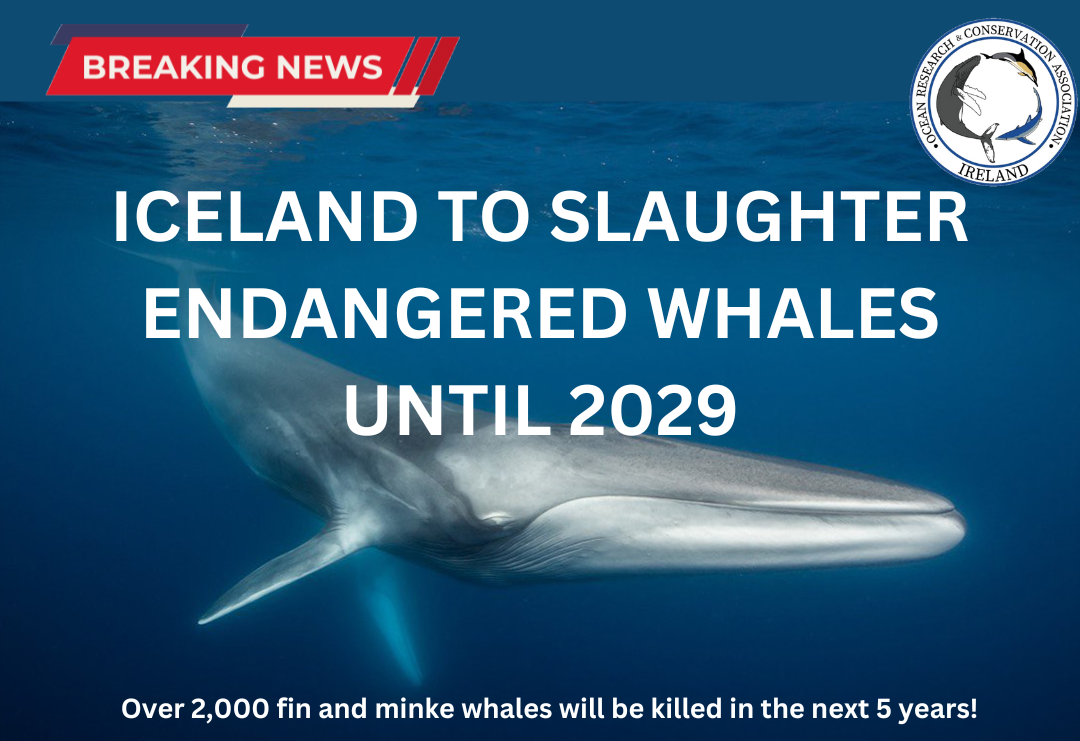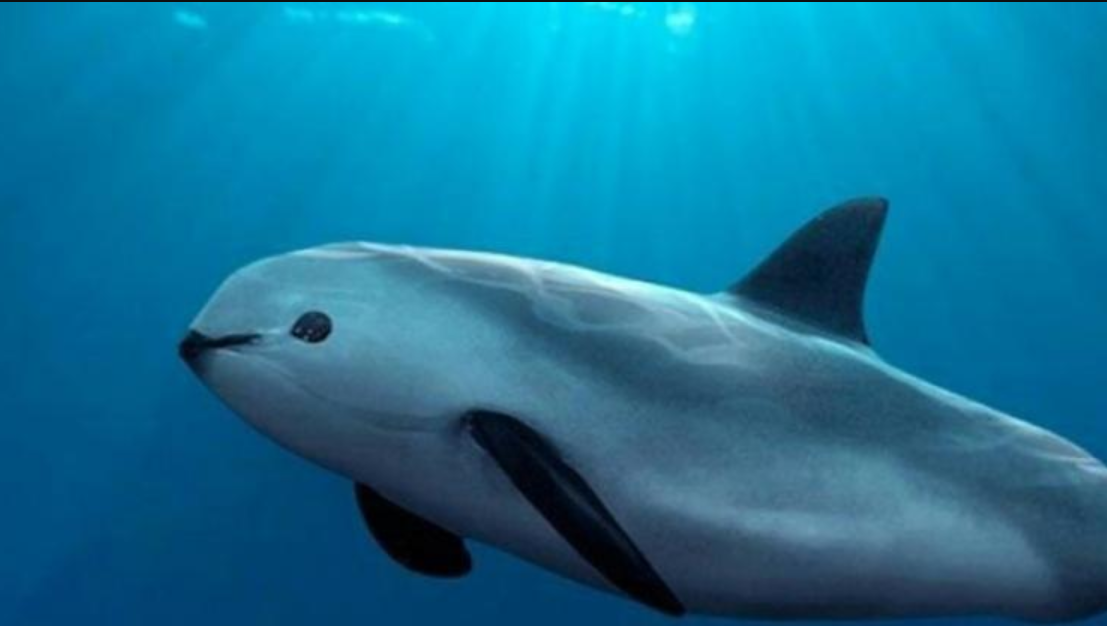ICELAND TO SLAUGHTER ENDANGERED WHALES UNTIL 2029
ICELAND TO SLAUGHTER ENDANGERED WHALES UNTIL 2029
ORCA SCICOMM TEAM | 4th January, 2025
Despite global efforts to protect marine wildlife, Iceland has recently been granted permits to hunt and kill fin whales and minke whales until 2029. The decision for Iceland to continue whaling has incited outrage among conservationists and animal welfare advocates worldwide. ORCA Ireland is among many global eNGO's taking a stand to raise awareness and rally support to end this brutal practice.

Background on Whaling in Iceland:
Iceland's whaling history dates back to the 19th century. Initially driven by the need for whale oil, which was used for lighting lamps and making soap. Modern whaling in Iceland has evolved into a contentious issue. Today, Iceland is one of the few countries that continue whaling, citing it as an essential part of their cultural heritage and economic necessity. Permits for whaling are typically issued for five-year intervals, with the last set expiring in 2023.
However, with the recent permits allowing the hunting of endangered fin whales and minke whales, concerns about the sustainability and ethics of this practice have intensified. The permits specify that only fin and minke whales can be hunted off Iceland's shores, while other whale populations remain protected under current regulations.
In 2023, Iceland resumed whale hunting under stringent regulations. These rules aim to ensure that the whaling industry operates within defined limits, setting quotas based on scientific advice. However, these measures have not assuaged the concerns of conservationists and animal welfare advocates who argue that no amount of regulation can justify the inherent cruelty and ecological damage caused by whaling. In the same year, a government-commissioned inquiry led to the suspension of whaling in Iceland for two months after it concluded that the methods used were not in compliance with animal welfare laws. This inquiry highlighted significant ethical and legal concerns about the current practices. In the shortened 2023 season, which lasted only three weeks, 24 fin whales were killed. The quota for that year allowed for the hunting of up to 209 whales.
Current status:
The new permits allow for the capture of 209 fin whales and 217 minke whales annually, during the whaling season which spans from June to September each year. According to an official notice, the permits issued in December 2024 are intended to provide "some predictability" for the whaling industry. The notice also states that the limits on the number of whales that can be hunted are based on scientific advice. Iceland is one of the last three countries in the world, alongside Japan and Norway, that still permit whaling. Whales are hunted for their meat, blubber, and oil, despite widespread international opposition.
Despite the backlash, the Icelandic government maintained that the total allowable catch follows advice from Iceland's Marine and Freshwater Research Institute, which it claims is based on "sustainable use and a precautionary approach.
What is whaling and why's it controversial?:
Whaling, the practice of hunting whales for their meat, blubber, and oil, is highly controversial due to the significant ethical, environmental, and economic concerns it raises. Critics argue that whaling causes immense suffering to highly intelligent and social animals and disrupts marine ecosystems. Additionally, the economic benefits of sustainable tourism, such as whale watching, far outweigh the profits from whaling, making the practice not only cruel but also economically shortsighted.
Environmental Impact:
This decision has been met with strong condemnation from animal rights and environmental organizations, who have criticized Iceland's outgoing conservative government for prioritizing whaling over animal welfare and environmental conservation.
Whales are keystone species in marine ecosystems, playing a crucial role in maintaining the health and stability of the ocean environment. By regulating the food chain and facilitating nutrient cycling, whales contribute to the overall productivity of marine life. The decline in whale populations due to hunting disrupts these ecosystems, leading to negative repercussions that extend far beyond the targeted species.
In addition, whales help combat climate change by influencing the carbon cycle. When whales dive deep into the ocean, they bring nutrients to the surface, which promotes the growth of phytoplankton. These microscopic plants absorb a significant amount of carbon dioxide from the atmosphere, playing a vital role in mitigating climate change. This positive feedback loop is vital for maintaining the balance of marine ecosystems and underscores the importance of protecting whale populations. Iceland's environment association has condemned the new permits, stating that they "violate the interests of the climate, of nature, and of the well-being of animals."
Animal Welfare Concerns:
The process of whaling is inherently cruel. Whales are often hunted with explosive harpoons, which cause immense trauma and prolonged suffering before death. Studies have shown that it can take several minutes to over an hour for a whale to die after being struck. The brutality of whaling has been condemned by numerous animal welfare organizations, emphasizing the need for immediate action to stop this inhumane practice. In 2023, the Icelandic government's veterinary agency monitored the whaling situation and found that the use of explosive harpoons was causing prolonged agony for the whales, further underscoring the cruelty of the practice.
Moreover, the intelligence and social complexity of whales add another layer to the ethical dilemma. Whales are known for their strong social bonds and sophisticated communication methods. The loss of a single whale can have devastating effects on the social structure and well-being of the entire pod. The emotional distress experienced by these highly intelligent animals further highlights the ethical issues surrounding whaling.
Economic Considerations:
Hvalur, the only remaining active whaling ship in Iceland, has had to rely on annual licence renewals, highlighting the uncertainty and controversy surrounding the whaling industry.
In recent years, whale watching has emerged as a significant industry in Iceland, drawing thousands of tourists from around the world. This form of sustainable tourism not only generates substantial revenue but also creates jobs and supports local communities. The economic benefits from whale watching far outweigh the profits from whaling.
By persisting with whaling, Iceland risks damaging its international reputation and the thriving tourism sector. Tourists are increasingly aware of and concerned about the ethical implications of their travel choices. Promoting whale watching over whaling aligns with the growing global trend towards sustainability and animal welfare. Furthermore, the economic stability provided by whale watching can foster long-term growth and development for local communities, ensuring that both wildlife and people can thrive.
International Opposition:
Globally, whaling is widely opposed. Many countries and international organizations advocate for the protection of whales and the cessation of all whaling activities. The International Whaling Commission (IWC), established to regulate whaling and conserve whale populations, has called for a moratorium on commercial whaling. Iceland, despite being a member of the IWC, has opted out of this moratorium, leading to international criticism.
The collective voice of the global community can play a crucial role in pressuring Iceland to reconsider its stance. International campaigns, petitions, and diplomatic efforts have successfully influenced other countries to abandon whaling in the past. By joining this global movement, we can amplify our impact and push for meaningful change. The international outcry against whaling in Iceland reflects a broader commitment to preserving our planet's biodiversity and protecting vulnerable species from exploitation.
Conclusion:
The time has come for Iceland to align with global conservation efforts and end whaling. Protecting these magnificent marine mammals is not only an ethical imperative but also essential for the health of our oceans and the well-being of future generations. Whales are more than just symbols of marine life; they are integral components of the ecosystems that sustain us all. Join ORCA Ireland in urging the Icelandic government to revoke these permits and put an end to whaling.
SHARE THIS ARTICLE













